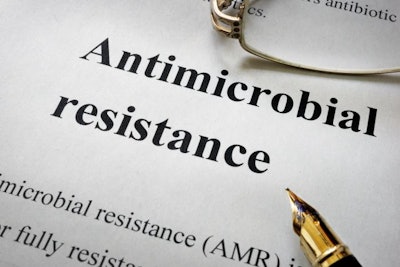
The Washington-based American Society of Microbiology (ASM) has established an initiative to complement existing efforts to combat antimicrobial resistance.
The ASM says the multi-stakeholder initiative will “share information, analyze the current status of (antimicrobial resistance) with a focus on resistance in organisms causing acute bacterial infections, and identify relevant needs and opportunities for addressing (antimicrobial resistance) across the microbial sciences.”
“The initiative’s subject matter experts have identified potential approaches to maximize the impact on public, animal, and environmental health, expand surveillance, promote rapid diagnostics, and implement stewardship across settings,” according to a press release.
An ASM steering committee has identified needs and potential opportunities for action, including:
- Expanding surveillance
- Stewardship
- Rapid diagnostics
- Data to guide therapy
- Harmonized antimicrobial susceptibility training
- Data and risk assessment
- Research funding
- Bioinformatics expertise
- Infection prevention activities
- Research for antibiotic development
- Improved lab capacity
- Improved infrastructure
Antimicrobial resistance “is an urgent global problem and will require global solutions. The ASM is well positioned to harness the reach and expertise of ASM members and partners to address current gaps in knowledge and activities and strengthen connections between initiatives to address surveillance and stewardship, environmental issues, clinical issues, and global perspectives,” ASM said in its report.
Also a concern in Europe
Antimicrobial resistance is also a concern across Europe. A report issued this year on antimicrobial-resistant bacteria found in humans, animals and food indicates that levels of resistance to a range of antibiotics remain high across the continent.
The report, published by the European Food Safety Authority (EFSA) and the European Centre for Disease Prevention and Control (ECDC), incorporates already-published U.K. veterinary surveillance data from 2015 and compares them with other countries for the first time.
“This shows that the work being done to reduce, refine and replace antibiotic use is a priority, and very necessary across both human and veterinary medicine,” said John FitzGerald of RUMA, the agricultural and food industry alliance which promotes responsible use of medicines in farm animals.
Comprehensive resource for antibiotic-free poultry production available
A new collection of exclusive articles, blogs, infographics and videos on antibiotic-free poultry production, by trusted WATT Global Media editors and industry experts, equip poultry producers and marketers with information to help them make critical business decisions. Purchase your copy.

















